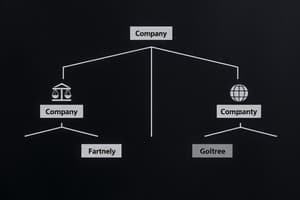Podcast
Questions and Answers
Une société peut être créée avec un seul associé dans tous les cas.
Une société peut être créée avec un seul associé dans tous les cas.
False (B)
Les associés peuvent apporter des biens matériels ou immatériels à la société.
Les associés peuvent apporter des biens matériels ou immatériels à la société.
True (A)
Les bénéfices générés par la société ne doivent pas être partagés entre les associés.
Les bénéfices générés par la société ne doivent pas être partagés entre les associés.
False (B)
L'affectio societatis désigne la volonté des associés de collaborer.
L'affectio societatis désigne la volonté des associés de collaborer.
Une EURL peut avoir plusieurs associés.
Une EURL peut avoir plusieurs associés.
Un objet social peut être flou et imprécis sans conséquence.
Un objet social peut être flou et imprécis sans conséquence.
Le capital social d'une SAS est entièrement libre sans montant minimum requis.
Le capital social d'une SAS est entièrement libre sans montant minimum requis.
La responsabilité des associés dans une SARL est illimitée.
La responsabilité des associés dans une SARL est illimitée.
Les statuts de la société doivent être établis et signés.
Les statuts de la société doivent être établis et signés.
Dans une SA, un conseil d'administration doit être composé de 3 à 18 membres.
Dans une SA, un conseil d'administration doit être composé de 3 à 18 membres.
Les sociétés à responsabilité limitée limitent les pertes aux apports.
Les sociétés à responsabilité limitée limitent les pertes aux apports.
Le président d'une SASU est toujours un salarié.
Le président d'une SASU est toujours un salarié.
Une société peut avoir un objet social illicite.
Une société peut avoir un objet social illicite.
La rémunération d'un gérant dans une SARL est déductible des bénéfices.
La rémunération d'un gérant dans une SARL est déductible des bénéfices.
Les associés d'une SNC ont une responsabilité limitée en cas de dettes.
Les associés d'une SNC ont une responsabilité limitée en cas de dettes.
Un dirigeant d'une SAS est soumis au régime social des non-salariés.
Un dirigeant d'une SAS est soumis au régime social des non-salariés.
Flashcards
Accord de Volonté
Accord de Volonté
Un accord de volonté entre les associés pour créer une société, comprenant le consentement de tous les associés, la mise en commun d'apports et l'intention de partager bénéfices et pertes.
Apport en numéraire
Apport en numéraire
Sommes d'argent apportées par les associés pour créer ou financer la société.
Apport en nature
Apport en nature
Biens matériels ou immatériels apportés par les associés pour créer ou financer la société, par exemple : locaux, équipements, brevets.
Apport en industrie
Apport en industrie
Signup and view all the flashcards
Capital social
Capital social
Signup and view all the flashcards
Affectio societatis
Affectio societatis
Signup and view all the flashcards
Objet social
Objet social
Signup and view all the flashcards
Statuts de la société
Statuts de la société
Signup and view all the flashcards
EI (Entreprise Individuelle)
EI (Entreprise Individuelle)
Signup and view all the flashcards
EURL (Entreprise Unipersonnelle à Responsabilité Limitée)
EURL (Entreprise Unipersonnelle à Responsabilité Limitée)
Signup and view all the flashcards
SARL (Société à Responsabilité Limitée)
SARL (Société à Responsabilité Limitée)
Signup and view all the flashcards
SA (Société Anonyme)
SA (Société Anonyme)
Signup and view all the flashcards
SASU (Société par Actions Simplifiée Unipersonnelle)
SASU (Société par Actions Simplifiée Unipersonnelle)
Signup and view all the flashcards
SNC (Société en Nom Collectif)
SNC (Société en Nom Collectif)
Signup and view all the flashcards
SNC (Société en Nom Collectif)
SNC (Société en Nom Collectif)
Signup and view all the flashcards
SA (Société Anonyme)
SA (Société Anonyme)
Signup and view all the flashcards
Study Notes
Types of Companies and their Characteristics
- EURL (Entreprise Unipersonnelle à Responsabilité Limitée): A single-member company with limited liability.
- SARL (Société à Responsabilité Limitée): A company with limited liability, needs at least two members.
- SAS (Société par Actions Simplifiée): A company with simplified structure, at least two members are needed.
- SASU (Société par Actions Simplifiée Unipersonnelle): A simplified company with limited liability, one-member form.
- SA (Société Anonyme): A public limited company with shares traded on the market. Minimum capital investment
- SNC (Société en Nom Collectif): A company with unlimited liability, all members are fully liable for company debts.
Capital and Members
- Capital Social: The initial investment in a company.
- Associés: Members/Shareholders of a company.
- Gérant (Manager): The manager who runs a company, potentially with specific responsibilities for decision-making or daily operations
Decision-Making
- Assemblée Générale: The general meeting where major decisions are made (general assemblies).
- Président/Directeur: The designated manager or leader and/or director of a company.
- Conseil d'Administration: This is an administrative board in larger companies (limited companies, with shareholders).
Liability and Remuneration
- Responsabilité: Liability for company debts and obligations.
- IR: Individual income tax (impôts sur le revenu)
- IS: Corporate tax.
- IS option: Additional special option for a given tax.
- Remuneration: Compensation or payment for work.
- Deductible: Amounts that can be subtracted from income when calculating taxes.
Other Considerations
- Cessions: Transfer of ownership of company shares.
- Conditions: Stipulations or requirements.
- Statuts: Legal documents defining the company's structure, policies, and operations.
Essential Elements of a Business Contract
- Consent of Parties: All members must agree to the business contract.
- Minimum Number of Members: Most companies need at least two members, unless they are single-member formations.
- Contributions: Each member must offer some form of contribution (cash, assets, or services).
- Profit and Loss Sharing: How profits and losses will be allocated among the members.
- Business Purpose: The company's activities must be lawful and clearly defined.
- Legal Form: Choosing the suitable legal structure.
- Articles of Association: Specify the company's structure, operation, and other key details.
Studying That Suits You
Use AI to generate personalized quizzes and flashcards to suit your learning preferences.



